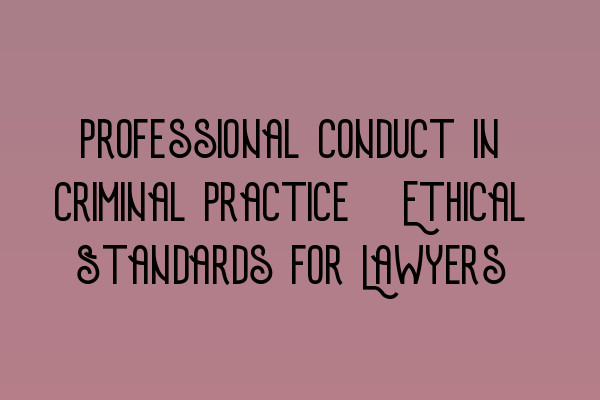Professional Conduct in Criminal Practice: Ethical Standards for Lawyers
Welcome to SQE Criminal Law & Practice Law UK! In this blog post, we will delve into the critical topic of professional conduct in criminal practice and explore the ethical standards that lawyers must adhere to in their profession.
Understanding Professional Conduct
Professional conduct refers to the behavior and ethics expected of lawyers in their practice. It encompasses a set of rules and principles that guide lawyers in their interactions with clients, opposing counsel, courts, and the legal system as a whole. Adhering to high ethical standards is essential for maintaining the integrity of the legal profession and ensuring fairness in the criminal justice system.
The Importance of Ethical Standards
Clear ethical standards are crucial for lawyers, as they dictate how legal professionals should handle various situations that arise in criminal practice. These standards help lawyers build trust with their clients, maintain professionalism, and uphold the principles of justice.
Some key ethical standards for lawyers in criminal practice include:
- Confidentiality: Lawyers must maintain strict confidentiality regarding information shared by their clients, ensuring that sensitive details remain protected.
- Conflict of Interest: Lawyers should avoid conflicts of interest that could compromise their ability to provide unbiased representation to their clients.
- Honesty and Integrity: Lawyers must always be truthful and act with integrity in their dealings with clients, courts, and other parties involved in the legal process.
- Professional Competence: Lawyers should constantly strive to enhance their knowledge and skills to provide the best possible legal representation for their clients.
- Respect and Courtesy: Lawyers must treat all parties involved in the legal process with respect and courtesy, promoting a fair and just legal system.
Implications of Ethical Misconduct
Failure to comply with ethical standards can have severe consequences for lawyers practicing criminal law. Ethical misconduct may lead to disciplinary action, damage to a lawyer’s reputation, and even disbarment in serious cases. Moreover, ethical violations can undermine the credibility of the legal profession and erode public trust in the justice system.
Continuing Professional Development
To ensure lawyers remain up to date with ethical standards and best practices, continuous professional development is essential. Lawyers should actively participate in relevant training programs and stay informed about changes in legislation and legal precedents that impact their practice.
At SQE Criminal Law & Practice Law UK, we offer comprehensive SQE preparation courses that cover not only legal knowledge but also professional conduct and ethics in criminal practice. Our courses are designed to equip aspiring lawyers with the necessary skills and knowledge to excel in the SQE exams and their future legal careers.
Conclusion
Professional conduct and ethical standards are the cornerstones of a successful and respected legal profession. Lawyers practicing criminal law must adhere to these standards to ensure the fair administration of justice and maintain the public’s trust in the legal system.
For more information on SQE exam preparation, check out our related articles:
- SQE 1 Practice Exam Questions
- SQE 1 Practice Mocks FLK1 FLK2
- SQE 2 Preparation Courses
- SQE 1 Preparation Courses
- SRA SQE Exam Dates
